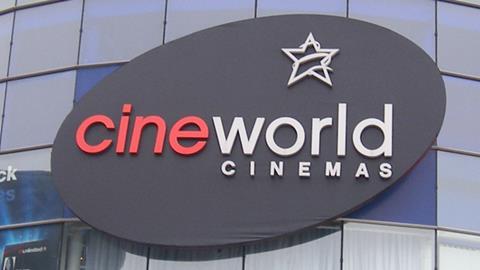Rising revenues mean exhibitor’s board are positive about future prospects despite Brexit turmoil.

Europe’s second largest exhibitor Cineworld Group has reported a 34.6% drop in pre-tax profits for the first six months of 2016, largely due to currency movements.
However, the group’s revenues were up 8.4% to £356.7m across the same period, with the opening of four new sites contributing to an overall 2.7% rise in admissions across its markets.
The fall in profits can largely be attributed to the steep decline of the British Pound against the Euro in the wake of June’s Brexit referendum, in which the British public voted to leave the European Union.
Currency movements have cost the company £6.1m over the last six months, the company said. The year-on-year comparative figure was compounded by an £8.9m exchange rate gain in the same period in 2015.
Around 20% of Cineworld’s debt (in total £250.3m) is comprised of Euros, meaning the value of those debts has risen over the last two months.
Speaking to Screen, Cineworld deputy CFO Nisan Cohen admitted that “Brexit had an impact” but called the profit shift only a “currency translation loss”, saying that the results were “solid” and “met expectations” providing a “good base for the second half of the year”.
Going forward, the company did not expect Brexit to have further implications for the business, Nisan said, claiming that “any economic slowdown” would be weathered comfortably by the cinema industry.
Joshua Raymond, market analyst at London brokerage XTB, commented that “[Cineworld’s] prospects for an even stronger second half of the year will be largely driven by the ability of the pound to recover - which there is little confidence over - and whether the upcoming slate of films to be released will continue to drive growth in admission sales.”
Positive future
After record-breaking box office statistics in 2015 – buoyed by the success of titles including Star Wars: The Force Awakens and Spectre – analysts had forecast a downturn in a 2016 that appeared to lack the same calibre of blockbuster titles.
However, Cineworld’s 2.7% rise in admissions across its markets points to continued health for the industry. Fellow chains Odeon & UCI and Everyman have also reported growing admissions so far in 2016.
Cohen noted that the period July – August so far had seen a 22% increase in admissions over the same period last year. While there is no James Bond to come in the latter half of 2016, releases including Star Wars spin-off Rogue One and Harry Potter spin-off Fantastic Beasts are predicted to do well.
UK business
In the UK & Ireland, Cineworld’s largest market, admissions dropped 4% in the first six months of the year, with box office takings declining 0.3%. The company’s board said this was “reflective of the film slate”.
Revenues were boosted by the performance of advertising company Digital Cinema Media (of which Cineworld owns 50%), which saw a 12.5% rise in trading.
The company’s recent acquisition of five sites from Empire Cinemas – including its premium Leicester Square location – will boost the business in the coming year, said Cohen.
Regarding it subsidiary business Picturehouse, Cohen said that it was “performing well and seeing strong admissions growth” and that the company remained committed to its current strategy of investment and that “no big changes” were expected to the current operation.
Commenting on the recent sale of the UK and Europe’s largest cinema chain Odeon & UCI to China-controlled exhibitor AMC – which has raised questions regarding the sustainability of the UK industry - Cohen said: “It’s a good sign, we welcome any consolidation in the market. I don’t think it will have a material impact on our business.”
Would Cineworld consider a takeover bid if an attractive offer was put on the table? “I don’t know, I don’t want to predict the future, but we are definitely here for the long term” affirmed Cohen, pointing to Cineworld’s recent acquisitions as a sign of “belief in our business and the cinema industry.”
























No comments yet